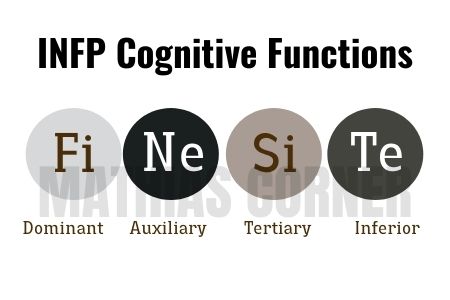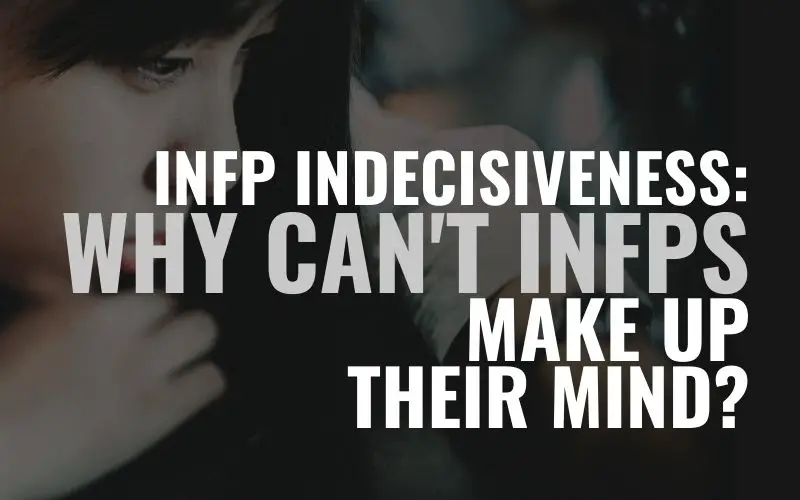“Should I find another job or go back to school?”
“What career path should I thrive on?”
“Out of 32 hobbies, where do I focus on?”
If these frustrations sound familiar to you, then you’re not alone.
Dang, these indecisive nights were probably the most agonizing parts of our life as INFP.
What’s worse, INFP’s indecisiveness gravely results from the desire to live an authentic life. Staying true to ourselves is an admirable trait. However, authenticity – the one thing INFP chases – carries some serious drawbacks, too, such as indecisiveness.
My Worst Experience as an Indecisive INFP
Back in college, I was torn between leaving Architecture and pursuing an Engineering degree. I’ve already spent one year in Architecture. However, I reached a point where if I stay a month more, it will be a road to my self-destruction.
The stress, sleepless nights, and the distrust of my own ability sucked my soul and led me to feel either anguish or grueling indifference.
Truly, Architecture is stunning, but I know it wasn’t for me. I was determined to leave.
But at the same time, I was worried about how my parents, friends, and mentors would respond. I was stuck in an awful rut.
Indeed, many were disappointed. I understand the frustration because, honestly, no one forced me into Architecture.
I liked it at first, until one day, I didn’t.
Eventually, the INFP in me pursued authenticity above all the expectations. In the end, I left for engineering, which is another slightly poor decision.
Truth be told, I don’t know where to fit in back then. It feels like everything is my calling. Every path seems reasonable, until one day, every inch of it just starts to repel me. Difficult times, years of frustration.
Thankfully, discovering and digging deep into my personality was a life-saver. It guides us on how to understand ourselves and overcome even indecisiveness.
Why are INFPs indecisive?
Why are INFPs indecisive? Why do we crave a plan, or a dream, then drop it halfway? INFPs are always caught between craving a moment and the desire to leave in an instant. Why do INFPs do this? Here’s why:
INFPs are naturally curious idealists who see a wide range of possibilities. However, indecisiveness comes when INFPs lack physical experience and background knowledge to decide whether an idea aligns with their values or not.
They may promise themselves to never leave a job. They may have high hopes and see opportunities in rose-colored glasses. However, it’s a different story when INFPs set their foot in. Once they throw themselves out there, they put everything they see, hear, feel, and touch under evaluation.
Which factors appeal to them? Which ones do not? INFPs may not notice but they actually keep a tally of what’s good and bad about their experience. Their default response is to confer all their experiences to their values, morals, and beliefs.
Picture this.
When an INFP starts on a new job, they evaluate and judge their surroundings:
“I like my desk. I like the benefits. Stacy is mean. I don’t like her. Jerry? He’s an insecure bully. The environment’s blaring. Good thing, the office is 10 minutes away from home. Pay isn’t good. I can’t stand angry clients.
Overall… I don’t feel like I can stay in this job.“
All these judgments happen unconsciously in an INFP’s mind. If it feels wrong for them, they quit the job and look for better opportunities For INFPs, it’s a constant chase for authenticity.
You may like this: 6 Best INFP Traits and Hidden Behaviors
But you know, INFP is actually a decisive personality type.
Now, let’s dive deeper into an INFP’s cognitive functions:

- Dominant: introverted Feeling (Fi)
- Auxilliary: extraverted iNtuition (Ne)
- Tertiary: introverted Sensing (Si)
- Inferior: extraverted Thinking (Te)
As you can see, INFP’s dominant function is introverted Feeling (Fi), which is a judging function. Having this function means… we judge.
Although some won’t admit it, INFPs silently evaluate a person’s behavior, tone of voice, ways of thinking, intention, and subjectivity.
INFPs have strong preferences. They instantly know what they feel about everything they are exposed to.
They have a thing to say about the heat of the sun, the messy room, the asymmetrical tiles, and even your choice of words.
If you hand art to INFPs, they immediately know if it stirs emotions or not. If you send them a story to critique, they know if it’s good or not. They either praise your work or internally judge where you fell short.
INFPs constantly, but unconsciously, tag everything as good or bad.
What mostly contributes to INFP’s indecisiveness?
Indecisiveness happens when the majority of INFP cognitive functions join in the process, especially, the extraverted iNtuition (Ne) and the Extraverted Thinking (Te).
Introverted Feeling (Fi) as a dominant function unconsciously decides if the situation aligns with your values.
Extraverted iNtuition (Ne) as an auxiliary function is responsible for INFP’s infinite production of ideas. It provides expanding and ever-changing possibilities which INFPs eventually test for themselves.
The extraverted Thinking (Te) as an inferior function gathers facts or opinions from other people, which most INFPs will try to adhere to. Indeed, INFPs are conscious of status, reputation, and how they appear to other people.
Let’s break down my example above:
“Back in college, I was torn between leaving Architecture and pursuing an Engineering degree.” (This is Ne. Seeing multiple possibilities, giving INFPs two to hundreds of choices.)
“I’ve already spent one year in Architecture. However, I reached a point where if I stay a month more, it will be the road to my self-destruction.” (This one’s Fi. INFP discern which aligns or drifts away from their values.)
“I was worried about how my parents, friends, and mentors would respond. I was stuck in an awful rut.” (This is Te. Caring for what others think, which contributes to INFP decisions.)
At the end of the day, INFPs lean on leaving a job, task, or place they find no meaning in. As a result, they would seek new opportunities once more, see if it aligns with their values, and decide whether they would settle with it or not.
The cycle goes on and on.
How does INFP overcome indecisiveness?
How do you break the dreadful cycle? Fortunately, there’s a way for INFPs to overcome indecisiveness.
The answer is experience.
INFPs learn from experience and application, and not by sole imagination. Truth be told, imagination messes with our decisions big time. INFPs light up with the sound of every new idea. But not until they gain experience. For sure, when they’re exposed to an experience, they would keep a record of how much they liked and hated a certain task.
When INFPs face new challenges, they solve them using the knowledge from past experiences. It’s our introverted Sensing (Si) at work. Our Si function is responsible for keeping the memories and impressions we felt from experiences.
That said, without sufficient, experiential knowledge, INFPs can’t weigh a situation right. Everything can be plausible for an INFP. They make superficial decisions based on what they imagined which results in rabid confusion.
As your Fi-Si loop becomes more adept at knowing what resonates with you, you end up with a more focused path, and firmer set of options.
Related Post: INFP Career: Finding the Right Job for INFP
Conclusion
Gaining experience lessen INFP’s indecisiveness. By trying out new things and encountering life, they start to sort what tasks resonate with which values.
Can you work under pressure? You think you can, but you can only measure your endurance after you experience pressure yourself.
Can you become a great teacher? You imagine you are, but you can only confirm it after experiencing boatloads of paperwork, misbehaved kids, and overtime work.
Indeed, this process involves a few trials and errors. Trying is a crucial part of an INFP’s growth. There’s no other way around.
That said, you must enjoy the trials and errors you go through today. Embrace the experience, and extract the significant lessons.
INFPs may be late bloomers due to this long path we take. However, with experiences, you eventually become more decisive. It will be your starting ground to let go of the hampering plans and lead a decisive life as a successful INFP.
Hope you learn something from this post. Take care! 🙂
Liked this post? You can support the blog here!
You may also like:



Thank you for this! Spot-on.
Glad it can help, Lisa! 🙂
This is spot-on! Very well-done!